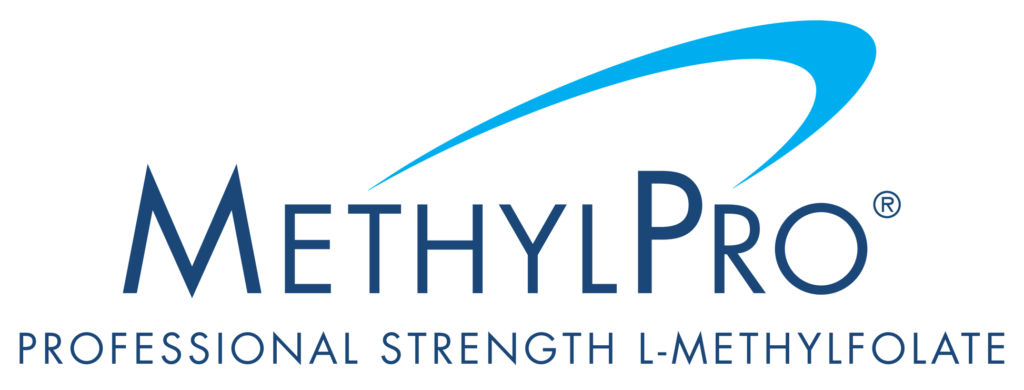Once you and your trusted health care professional have decided that supplementing with L-methylfolate is right for you, the next step is deciding on a dose and MethylPro formula. At MethylPro, we offer:
- L-Methylfolate as a standalone product in six different levels of dosage (1, 2.5, 5, 7.5, 10, or 15 mg)
- L-Methylfolate in three levels of dosage (5, 10, or 15 mg), in combination with our best-selling B-complex vitamin supplement formula
- L-Methylfolate in three levels of dosage (5, 10, or 15 mg), in combination with “cofactors” (vitamin B-12, vitamin B-6, and magnesium) in three levels of dosage
- L-Methylfolate in 15 mg dosage, in combination with a full-spectrum daily multivitamin.
What is Methylation?
Most likely, the reason you have decided to start supplementing with L-methylfolate is that you have a genetic mutation which is affecting the methylation process that takes place in most cells of your body. Methylation is the addition of a single carbon and three hydrogen atoms (called a methyl group) to another molecule. The removal of a methyl group is demethylation.
Methylation and demethylation can be compared to tiny on and off switches in cellular processes involved in things like the fight-or-flight stress response, inflammatory response, immune response, isolating energy from food, regulating your brain chemistry, and cellular detoxification of hormones, chemicals, and heavy metals [1].
Methylation is also necessary for the production and recycling of glutathione: the body’s master antioxidant. Glutathione directly neutralizes free radicals, promotes health inflammatory response, and contributes to the effect of other antioxidants like vitamin C, E, and lipoic acid [1].
What are L-Methylfolate “Cofactors” and Do I Need Them?
Supplementing with L-methylfolate is a great start to improving your body’s ability to methylate effectively, as your cells will now have access to a supply of the activated form of folate as a methyl donor. However, L-methylfolate is not the only precursor for methylation. The essential cofactors for folate provided by this formula are B-6, B-12, and magnesium.
Homocysteine levels can build up in the blood without vitamin B-6, as B-6 aids in glutathione synthesis using homocysteine [2]. B-12 insufficiency can also halt the same cycle, but by preventing homocysteine from being converted to methionine. L-methylfolate and B-12 are essentially coenzymes in the folate methylation process. More specifically, the primary remethylation pathway is catalyzed by methionine synthase with the help of vitamin B-12 and activated folic acid (L-methylfolate) [2].
The process of methylation involves two cycles: the folate cycle and the S-adenosyl methionine (SAM) cycle. If you select a MethylPro formula with cofactors, you are providing your body with B-6 and B-12 to complement L-methylfolate’s action in the folate cycle of the methylation process.
“Cofactors” also include magnesium. Magnesium is a cofactor in more than 325 enzymatic reactions and about two-thirds of the American population are likely not getting enough magnesium from their diets [3]. Magnesium is a cofactor for the COMT enzyme, which transfers a methyl group from SAMe to metabolize dopamine, norepinephrine, and epinephrine [3].
Many people who have experienced folate deficiency due to genetic mutations have also experienced mood imbalance from insufficient or dysregulated neurotransmitter synthesis. Once the methylation cycle is stabilized with supplementation, adequate magnesium levels will also become more important as the body and brain need to process the upregulation of neurotransmitters being created [3].
This, of course, is only one benefit to taking a magnesium supplement, among hundreds.
If the Cofactors Cover Methylation, Why Choose a B-Complex Instead?
The real question here is “are you taking a B-complex vitamin supplement already?” If you are, then, by all means, please skip this combo and select L-methylfolate alone to supplement your L-methylfolate needs. If you are not yet taking a B-complex vitamin, let us explain why you might consider it:
The vitamin B-complex refers to all of the known essential water-soluble vitamins except for vitamin C. B-vitamins are extremely valuable for biological functions throughout the body. We describe the benefits of B-6, B-12, and B-9 (folate) above. Vitamin B-1 (thiamin), vitamin B-2 (riboflavin), and vitamin B-3 (niacin) are all deeply involved in energy metabolism [4]. Vitamin B-1 has neurological benefits and B-2 helps maintain healthy eyesight [4]. B-3 aids in proper digestion and maintenance of a healthy appetite [4].
Biotin is also part of the B-vitamin family, but we rarely refer to it as vitamin B-7. Biotin is yet another B-vitamin necessary for the metabolism of food into energy. It’s necessary for the function of several enzymes (carboxylases) that participate in important metabolic pathways, such as the production of glucose and fatty acids [5]. It is also necessary for the health of hair and skin [5].
The main function of vitamin B-5 (Pantothenic Acid) is the synthesis of coenzyme A (CoA) and acyl carrier protein, making it essential for both fatty acid synthesis and degradation [6].
Non-Bs in the B-Complex
Inositol is not technically a B vitamin, but it may help to balance mood in a way that complements the B-vitamins you are taking for methylation. Inositol plays a role in the synthesis of serotonin, the calming neurotransmitter [7]. It also can affect mood due to the role it plays in regulating blood-glucose and insulin sensitivity [8].
Choline is also not a B-vitamin but nicely complements the B-complex as an alternative methyl donor (similar to folate/B-9) for healthy methylation. Humans do produce some choline endogenously in the liver, but the amount that the body naturally synthesizes is not enough to meet our metabolic needs. Therefore, we must get choline either from the diet or from a supplement. It plays a role in the structural integrity of all cells and is needed to produce acetylcholine, an important neurotransmitter for memory, mood, muscle control, and other brain and nervous system functions [9].
Para-aminobenzoic acid, or PABA, is a chemical substance within the folate vitamin, and so we can consider it a part of the B-complex. PABA functions with the folate cofactor tetrahydrofolic acid (THFA) to aid in protein metabolism and blood cell formation and is important to your hair, skin, and digestive health [10].
When deciding upon an L-methylfolate formula, please consider the benefits you are looking for and what your diet and supplement regime already provide. Although B-vitamins are water soluble and non-toxic, it is important you are providing adequate levels to reach your metabolic potential. You don’t want to overload your system with unnecessary levels of vitamins that we cannot use effectively. Please review these options with your trusted health care professional before making an educated choice.
References
- https://www.mindbodygreen.com/0-18245/methylation-why-it-matters-for-your-immunity-inflammation-more.html
- https://www.hdri-usa.com/assets/files/role_of_b_vitamins_in_biological_methylation.pdf
- http://www.immh.org/article-source/2016/11/17/magnesium-the-missing-link-in-mental-health
- https://www.healthline.com/health/symptoms-of-vitamin-b-deficiency
- https://www.medicalnewstoday.com/articles/318724.php
- https://ods.od.nih.gov/factsheets/PantothenicAcid-HealthProfessional/
- https://citeseerx.ist.psu.edu/document?repid=rep1&type=pdf&doi=21bd30f988eb6d948e479222df9d082287ecd47b
- https://www.cell.com/trends/endocrinology-metabolism/pdf/1043-2760(90)90029-3.pdf
- https://ods.od.nih.gov/factsheets/Choline-HealthProfessional/
- https://scholar.google.com/scholar?cluster=3411092862904218242&hl=en&as_sdt=0,5

